

Whenever the issue of air pollution is discussed in Pakistan, the conversation typically shifts to its visible impacts on human health, agriculture, and urban life. However, a lesser-known but equally significant outcome of air pollution is its impact on the nation's rich biodiversity, particularly affecting migratory birds.
These birds, which cross continents during their annual migration, are increasingly facing existential threats from the heavily polluted skies that are also accelerating the impacts of climate change.
Pakistan acts as a crucial route for millions of migratory birds. The country's Indus Flyway Zone is part of the Central Asian Flyway — stretching from Siberia to the Indian Ocean — which these birds navigate their way through.
These birds, including the Siberian crane, the common teal, and the wigeon depend on the country's wetlands, rivers, and forests as stopovers for resting and refuelling during their long journey.
However, the once-friendly skies are growing progressively more and more hazardous to the birds, as Pakistan battles an intense air pollution crisis as the second most polluted country, based on its air quality index (AQI) in 2023.
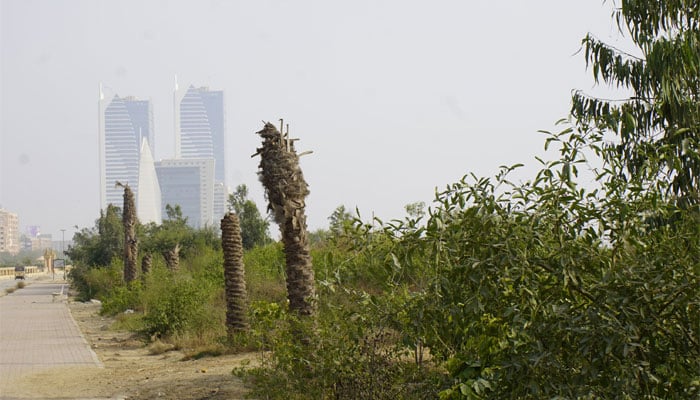
Despite a slight decline in the country's air pollution, as noted in a recent annual Air Quality Life Index (AQLI) report, the threat of worsening air contamination continues to loom over Pakistan, particularly in major urban cities like Lahore and Karachi, which are often listed among the most polluted cities in the world.
IQAir, a Swiss air quality technology company, reported that, based on the recommendation of the World Health Organisation (WHO), the concentration of particulate matter 2.5 (PM2.5) — lung-damaging airborne particles — shouldn't exceed five micrograms per cubic metre (μg/m³).
Nevertheless, in the company's annual global air quality report for 2023, Pakistan maintained the second-worst air quality level, with an average PM2.5 concentration of 73.7μg/m³.
In the IQAir report, Lahore ranked as the world's fifth most polluted city, with its average PM2.5 concentration levels reaching 99.5μg/m³. This led to a court-directed 'smog emergency' in November last year, locking down the city.
Meanwhile, Karachi's average PM2.5 concentration levels reached 56.5μg/m³, still ten times higher than that of WHO's prescribed concentration levels.
It is crucial to understand how this has affected the migratory birds that travel to Pakistan in winter.
Invisible toll of air pollution
Such dangerous levels of PM2.5 in the environment can be detrimental to migratory birds. Just like humans, birds may also suffer from breathing difficulties and a weakening immune system if exposed to polluted air for extended periods. This may influence the way they move around, hunt for their prey, or protect themselves from predators.
Additionally, the effects of air pollution extend beyond physical health, impacting the ecosystems that these birds rely on for survival.
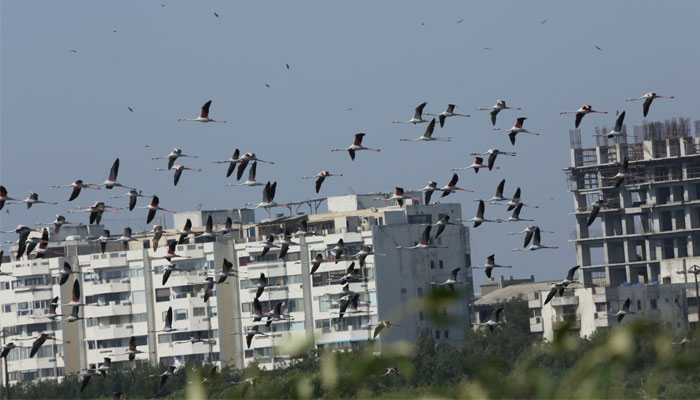
Asas Husain, a biodiversity expert and founding member of the MinusFifteen Project — an initiative that aims at implementing sustainable solutions to help reduce Lahore's average summer temperature by 15°F over the next decade — told Geo.tv that Pakistan's wildlife, especially migratory birds, relies heavily on a healthy population of native flora.
However, the degradation of natural habitats in the country due to air pollution is an additional concern and makes it difficult for these birds to thrive in the region.
Pakistan's wetlands, used by these birds as stopovers during their migration, are under threat from industrial pollution and agricultural runoff, affecting aquatic life that many birds depend on for food.
What's contributing to air pollution in Pakistan?
The air in these cities is often contaminated with hazardous pollutants, posing serious threats to both humans and wildlife, including migratory birds.
These pollutants include black carbon, nitrogen dioxide (NO2), sulfur dioxide (SO2), volatile organic compounds (VOCs), carbon monoxide (CO) among other harmful chemicals.
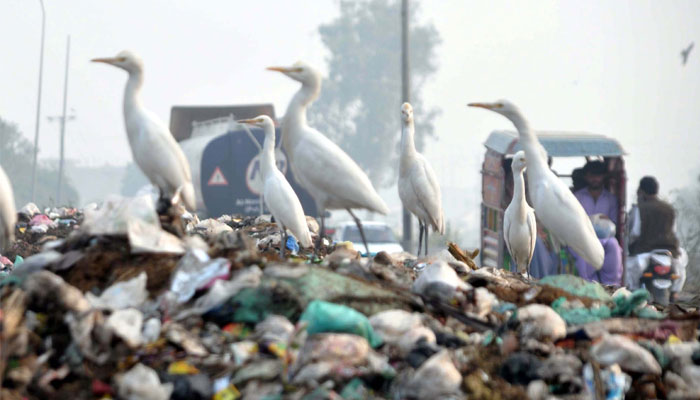
All these pollutants and contaminants are spewed into the air by millions of road vehicles in urban centres like Karachi, Lahore, and Islamabad, operating with outdated, unsafe engines and consuming substandard fuels.
In the year 2020, during the COVID-19 lockdowns, IQAir noted signs of improvement in air pollution levels, but these improvements failed to sustain once the world started opening up.
Other sources include brick kilns and steel mills that rely heavily on fossil fuels such as coal, emitting unregulated pollutants that threaten the survival of migratory birds. The uncontrolled emissions from these factories negatively impact air quality, surrounding ecosystems, and bodies of water.
Additionally, the open burning of materials like wood, garbage, and plastics on streets releases toxic fumes, further aggravating pollution.
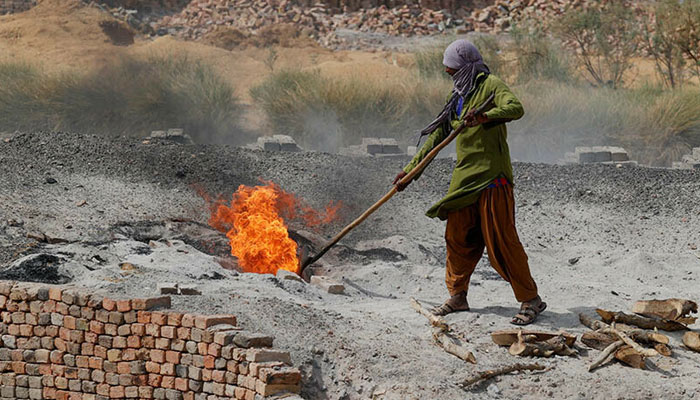
Mariam Shah, the head of communications at Pakistan Air Quality Initiative (PAQI), said, "Air pollution and climate change have a profound relationship whereby both impact each other."
"The simplest explanation is that the pollutants in air pollution enhance the greenhouse effect, contributing to climate change, and both cause respiratory system irritation," she told Geo.tv.
Climate change: A compounding crisis
Greenhouse gases, such as carbon dioxide (CO2) and methane (CH4), trap heat in the Earth's atmosphere, leading to rising temperatures and shifting weather patterns. In Pakistan, this has resulted in more frequent heatwaves, altered rainfall patterns, and the shrinking of crucial wetlands.
Speaking to Geo.tv about how climate change, influenced by air pollution, may affect the movement of migratory birds, Masood Lohar, the founder of Clifton Urban Project, revealed that birds were changing their traditional migration routes to adapt to new climate conditions.
Birds that once relied on predictable seasonal changes to time their migrations are now facing uncertain conditions.
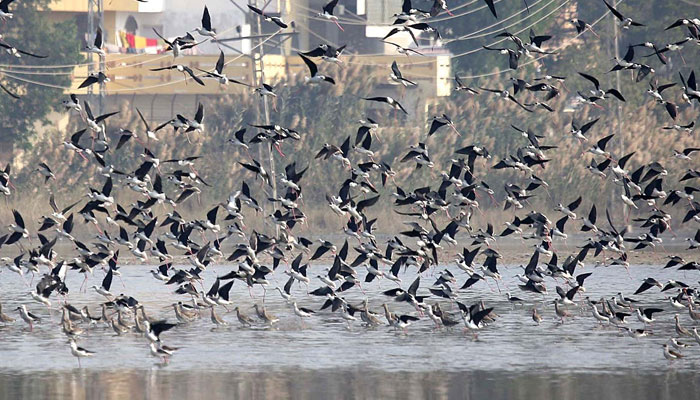
"The timing of bird arrivals in different regions is becoming more variable. Large-scale climate patterns are influencing this variability, which can affect environmental cues like temperature and weather patterns," he said.
"Climate change is altering habitats along migration routes, making some areas less suitable for stopovers and forcing birds to find new routes or destinations."
Moreover, untimely weather could delay migration and expose birds to cold conditions they are not adapted to.
"Such environmental changes highlight the need for conservation efforts to adapt to shifting bird migration patterns, ensuring that they have the necessary resources and habitats to thrive," Lohar stressed.
A call to action
The International Day of Clean Air for Blue Skies, commemorated on September 7 each year, offers Pakistan an opportunity to reflect on the dangers air pollution has posed to human life and biodiversity in the country.
Protecting migratory birds requires a multi-faceted approach that includes reducing industrial emissions, enforcing stricter environmental regulations, and promoting cleaner biodiversity.
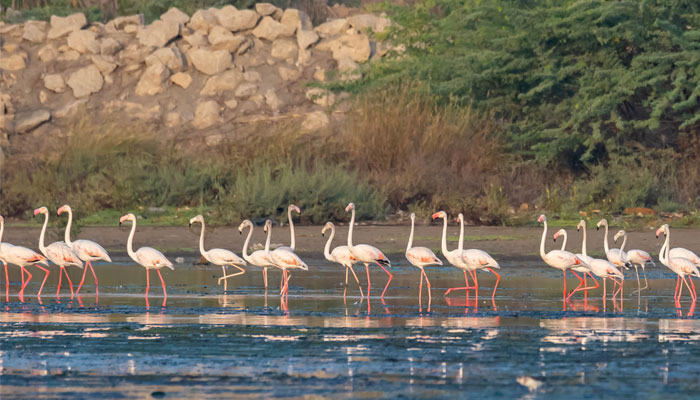
On the bright side, initiatives such as the Clifton Urban Project and the MinusFifteen Project have raised hopes that things may change for the better through collaborative efforts to mitigate rising air pollution and spread awareness among citizens.
According to Lohar, the Clifton Urban Project planted 700,000 trees, including 600,000 mangroves in Karachi's Clifton area, positively impacting local air quality and bringing several migratory birds back to the region.
"The lagoon that we developed, as well as the forest, have recorded 140 bird species, including Siberian ducks and flamingos — lesser and greater flamingos — which is very unusual," he said.
On the other hand, MinusFifteen's Asas Husain highlighted that "when we lose an abundance of plants in our urban settings, we end up feeling the effects of pollution much more."
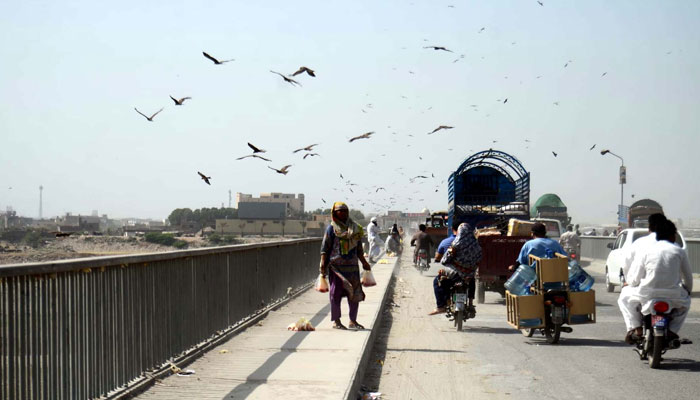
"The MinusFifteen project aims to make a series of interventions in civilian settings, including but not limited to native tree plantation campaigns," Husain said, adding, "Vegetation is environmentally beneficial due to the fact that plants filter our atmosphere and produce clean oxygen for us."
Husain added that the project, currently focused on Lahore, was "massively scalable" and may be expanded to other cities, "especially since temperature reduction campaigns and air quality control measures were necessary throughout the country.
"A simple way to combat the problem of air pollution would be to plan our urban spaces intelligently going forward, and make sure we leave plenty of room for wild, native areas," Husain emphasised.
A shared responsibility
It is imperative to understand that the war against air pollution is something that everyone has to take part in as a shared responsibility, as the world marks the International Day of Clean Air for Blue Skies.
While speaking on how to decrease the effects of air pollution on migratory birds, Husain said: "The more habitat we restore, the better their (migratory birds) chances at thriving in the future".
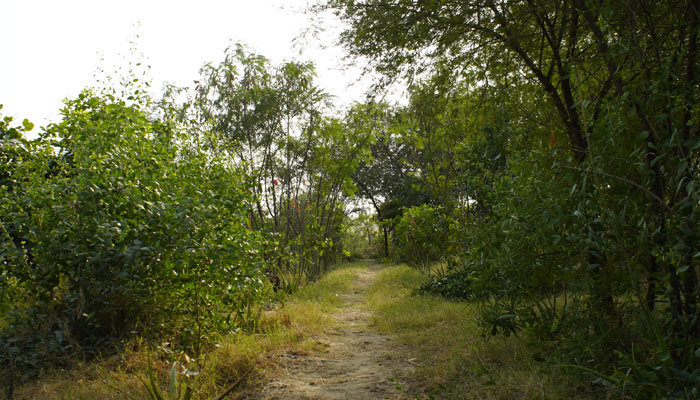
"Planting native flora rather than invasive species like Eucalyptus is crucial here, because the species of birds and other animals that have evolved to live in Pakistan's ecosystems have evolved alongside the native plants."
Shah suggests that people can help reduce the drastic impact of air pollution by:
Reducing vehicle usage by walking, cycling, carpooling, or using public transport wherever possible.
- Turning off engines in traffic jams if the wait is longer than 30 seconds.
- Maintaining vehicles for better fuel efficiency.
- Turning off lights and appliances when not in use, using energy-efficient ones, and promoting the installation of clean and renewable energy sources.
- Planting trees.
- Avoiding the burning of trash, garden waste, wood, and coal for heat and food, and replacing them with clean fuels.
The air we breathe and the skies we cherish belong not only to us but also to the countless creatures that depend on them. If we want migratory birds to continue beautifying Pakistan's skies, we must ensure that this generation does everything possible to enrich our natural heritage for those who come after us.












